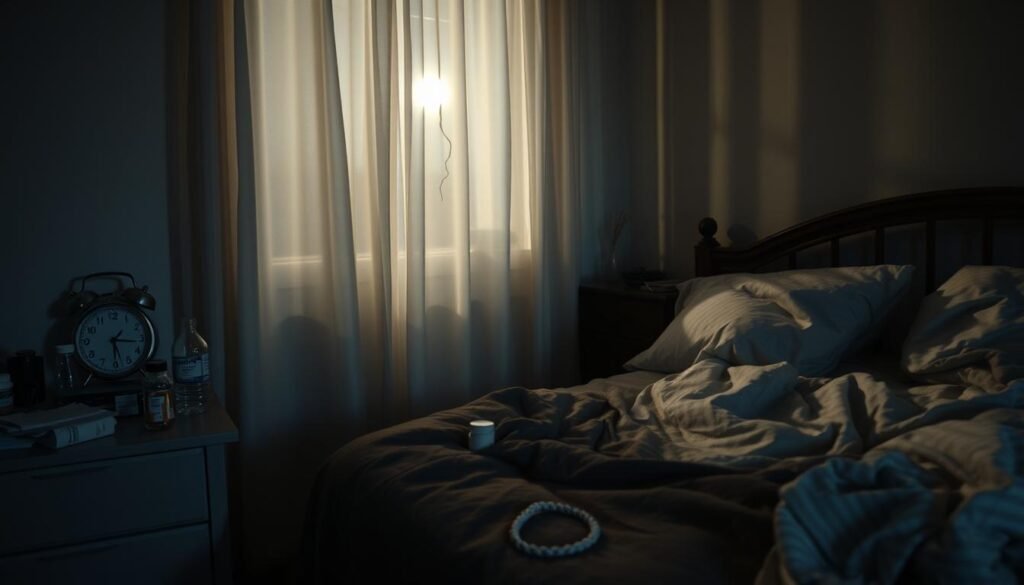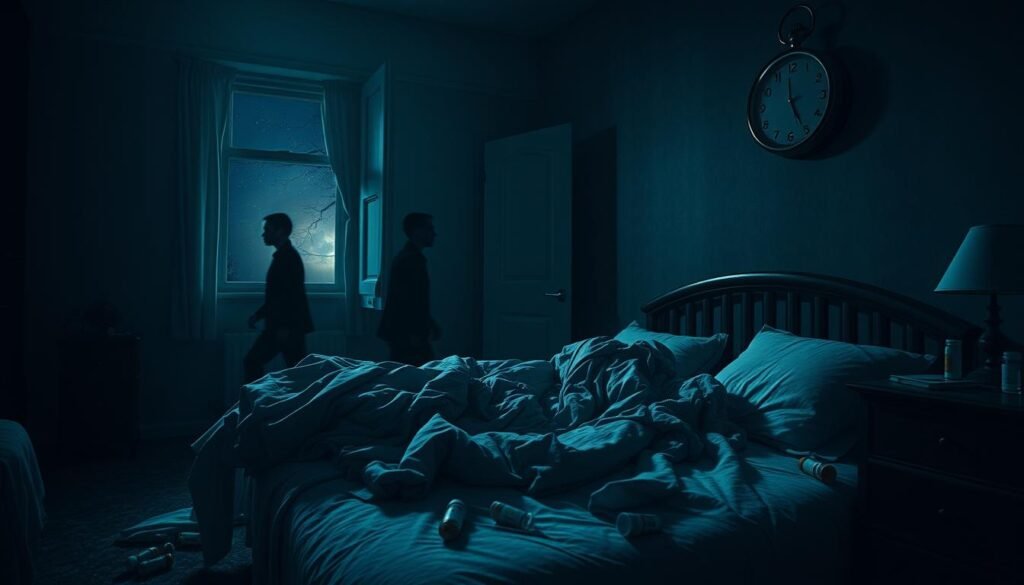About 48% of patients experience trouble sleeping after surgery because of discomfort. Insomnia two weeks post-surgery is quite common. It’s very important to know that getting over sleep issues helps recovery and well-being a lot. After an operation, sleep problems can happen for many reasons. They can also last much longer than the surgery itself. So, we will look into how to handle sleep problems after surgery and why good sleep is key to getting better.
Key Takeaways
- Approximately 48% of patients experience discomfort leading to sleeplessness post-surgery.
- Insomnia can affect both rapid eye movement (REM) and short-wave sleep after seven days post-operatively.
- Managing pain effectively is vital in reducing sleep disturbances.
- Environmental factors like noise and light greatly impact sleep quality in hospitals.
- Sleep disturbances can last from a few days to several weeks, affecting overall recovery.
- Understanding the reasons for insomnia can help in developing effective management strategies.
Understanding Post-Surgery Insomnia
Many patients struggle with sleep difficulties after surgery. This issue is complex as it stems from both mental and physical hurdles. It’s especially common after big surgeries. These problems hinder the essential sleep needed for recovery.
A study in 2022 found that sleep problems usually start within the first week after surgery. But, for some people, these issues can last much longer. Pain is often the main reason, affecting how long and well we sleep.
Worry before surgery can make recovery tougher. This anxiety can lead to more pain and sleepless nights. Sleeping pills may help, but it’s important to talk to a doctor first. This ensures safety from side effects and drug interactions.
To fight insomnia, making your bedroom peaceful is key. Things like noise-canceling earplugs and comfy pillows make a difference. If sleep troubles don’t go away, getting professional advice is a smart move.
What Causes Insomnia After Surgery
Knowing why insomnia happens after surgery can make recovery smoother. Sleep gets affected by things like pain, medicines, and hospital noise. Let’s look at the reasons sleep gets disrupted after an operation.
Pain and Discomfort
Pain after surgery is a big reason sleep suffers. The discomfort from the operation can make it hard to sleep well. Handling pain well is key because it helps patients recover and feel better faster.
Impact of Medications
Some drugs given after surgery can mess with sleep. Opioids, steroids, and anesthesia can change how you sleep, especially in older folks. These side effects can make insomnia worse, so talk to your doctor if you’re worried.
Environmental Disruptions
Hospitals aren’t the best places to sleep. The noise from machines and the bright lights can keep you awake. Making these better helps sleep and recovery. For tips on dealing with insomnia, check this guide.
Insomnia 2 Weeks After Surgery: How Common Is It?
Many patients find they can’t sleep well two weeks after surgery, facing what is known as short-term surgical insomnia. About 30% of patients struggle with sleep early on in their recovery. While some get their normal sleep back within a week, others face ongoing sleep problems.
There are many reasons why people have sleep issues after surgery. For example, 62% of folks recovering in the ICU from chest surgery still had bad sleep six months later. Also, many who have heart surgery don’t know they have obstructive sleep apnea, which makes recovery harder and can make insomnia worse.
Making changes like skipping social events can also make sleep issues feel worse. But creating bedtime rituals or trying Cognitive Behavioral Therapy for Insomnia (CBT-i) can help. Knowing how common insomnia is and why it happens can help people find good ways to deal with it. This leads to a smoother recovery.
| Post-Surgery Insomnia Statistics | Percentage |
|---|---|
| Preoperative sleep disorders prevalence | 8.8% – 79.1% |
| Insomnia in patients 1 year post-lung cancer surgery | 49.7% |
| Patients in ICU reporting poor sleep post-thoracic surgery | 62% |
| Increase in insomnia rates after arthroscopic hip surgery | From 8.8% to 17.8% |
| Patients experiencing post-surgery insomnia | Up to 30% |
Effects of Hospital Environment on Sleep
The quality of sleep in hospitals is greatly affected by their environment, leading to sleep difficulties in hospitals. Noise, strange places, and medical routines can all make it harder for patients to get better. Knowing about these factors helps healthcare workers make hospitals a better place for recovery in medical settings.
Noise Levels
High noise is a big problem in hospitals. Alarms, staff talking, and machines can be really loud for patients. Research tells us that patients don’t sleep as well in hospitals. Their sleep quality drops, shown by sleep scores going from 8.62 to 11.31. Patients get about an hour less sleep. This too much noise makes it hard for them to sleep well and slows down healing.
Unfamiliar Surroundings
Being in a place you don’t know can make patients feel more anxious. This anxiety makes it hard to sleep well, which is bad for their health. They feel uncomfortable in the hospital, which can make their condition worse and stop them from sleeping well. This lack of familiar settings makes it hard to get the healing sleep they need.
Strategies to Improve Sleep Post-Surgery
Getting better sleep after surgery helps with healing. It’s important for patients to improve their sleep area. This helps in managing pain and sleeping well during recovery.
Creating a Comfortable Sleep Environment
Creating a nice sleep space is key for good sleep hygiene. The goal is to have a welcoming and peaceful place to rest. Here’s what you can do:
- Utilize supportive pillows that accommodate the body post-surgery.
- Keep the room dark to facilitate a relaxed atmosphere.
- Maintain a cool temperature to soothe the body during rest.
- Limit noise by using earplugs or white noise machines to drown out disruptive sounds.
Managing Pain Effectively
Managing pain is crucial for better sleep. Talking openly with doctors can create a good pain management plan. Here are some things to consider:
- Utilizing prescribed medications as directed to alleviate discomfort.
- Incorporating ice or heat therapy based on personal comfort preferences.
- Engaging in physical therapy to gradually enhance mobility and reduce pain.
- Avoiding excessive daytime napping, which may disrupt nighttime sleep patterns.
Temporary Insomnia Due to Surgery: Timeline for Recovery
Recovery time after surgery differs for everyone. Some see sleep get better in the first week. Temporary insomnia after surgery is common. Many people have trouble sleeping well after an operation. They may find it hard to fall asleep, wake up often, or have a light sleep.

About 26.1% of patients face insomnia three days after surgery. This shows how common sleep problems are after operations. Pain, stress, and anesthesia can mess with regular sleep habits. Managing these symptoms well can speed up recovery.
| Recovery Week | Typical Improvement | Common Symptoms |
|---|---|---|
| 1 | Initial signs of improvement in sleep | Difficulty falling asleep, frequent awakenings |
| 2 | Continued improvements as healing progresses | Daytime fatigue, light sleep disruptions |
| 3+ | Significant restoration of normal sleep patterns | Return to typical sleep quality, reduced insomnia symptoms |
If sleep problems last more than a few weeks, it might be something like anxiety or depression. It’s important to take care of your mental health. This helps sleep quality and recovery. If sleep issues are big, look into recommended resources. They can really help. For more on how insomnia affects patients, click here.
Importance of Sleep for Recovery
Sleep is key to recovery. It helps brain health after surgery and strengthens the immune system. Getting enough rest is vital when recovering from surgery, as it helps the body heal and become strong during this important time.
Cognitive Function
Good sleep improves how we think. It makes us better at focusing, making decisions, and staying clear-headed. These skills are important for people getting better after surgery. Pain and stress after surgery can impact brain health. But with enough sleep, the brain can repair and work well, making rehabilitation and daily life easier.
Immune Response
Sleeping well boosts the immune system, which is critical after surgery. The connection between immune health and sleep is strong; good sleep helps the body fight off infections and heal wounds quickly. Lack of sleep can weaken the immune system, causing delays in recovery. Therefore, practicing good sleep habits is crucial for a healthier immune system during recovery.
| Factor | Effect |
|---|---|
| Sufficient Sleep | Enhances cognitive function and supports immune response |
| Pain Management | Reduces sleep disturbances and aids cognitive health |
| Relaxation Techniques | Promotes restful sleep, enhancing recovery |
| Post-Surgery Rehabilitation | Integrates sleep strategies for better recovery outcomes |
Alternative Solutions for Sleep Disturbances
After surgery, finding effective sleep solutions is key for recovery. Many methods can help manage insomnia and ensure a good night’s sleep. This discussion will cover relaxation techniques and sleep aids for post-surgery healing.
Relaxation Techniques
Relaxation methods can make falling asleep easier. Mindfulness meditation, deep breathing, and gentle stretches lower stress and improve relaxation. They benefit mental health and sleep quality. These practices help create a soothing bedtime routine.
Sleep Aids and Medications
Talking to healthcare providers about sleep aids is vital for recovery support. There are many options, from natural remedies to prescription drugs. Over-the-counter sleep aids like sedating antihistamines can help but might lead to daytime sleepiness. Prescription medications, such as nonbenzodiazepines, are used for short-term relief. Care is needed to prevent dependence.
Some effective prescription options include:
- Melatonin agonist medications, like ramelteon, help if you have trouble falling asleep.
- Orexin receptor antagonists, such as suvorexant, are good for falling asleep and staying asleep.
- Nonbenzodiazepine receptor agonists are effective long-term without causing tolerance issues.
Behavioral therapies are often recommended first for insomnia. They’re effective and carry fewer risks than drugs. It’s important to work closely with your doctor to find the best approach.
| Type of Sleep Aid | Usage | Potential Side Effects |
|---|---|---|
| Over-the-counter Antihistamines | Short-term relief | Daytime drowsiness, dry mouth |
| Melatonin Agonist (Ramelteon) | Sleep onset insomnia | Limited, generally safe |
| Orexin Receptor Antagonist (Suvorexant) | Sleep onset & maintenance | Possible next-day drowsiness |
| Nonbenzodiazepine (Eszopiclone) | Short to long-term insomnia | Side effects possible |

Insomnia Management: When to Seek Help
Post-surgery insomnia can really affect recovery and overall health. It’s important to know when to see a doctor for sleeping problems. If insomnia lasts more than a few weeks, it may signal a deeper issue that a professional should check.
People with serious sleep troubles should look into insomnia treatment. This is especially true if they feel very anxious or are in constant pain. Key signs that you need to see a doctor are:
- Inability to fall or stay asleep consistently.
- Increased fatigue or lack of daytime energy.
- Feeling overwhelmed by worries regarding sleep.
- Notable disruptions in daily activities due to poor sleep.
For those struggling regularly, finding the right treatment is key. This may involve specific medicines or natural remedies, like herbal teas or essential oils, to calm the mind. Developing personal methods to deal with pain and anxiety can also improve sleep quality.
Patients should get advice from healthcare professionals on beating insomnia after surgery. Figuring out when to see a doctor for sleep problems is a big step towards better health.
Starting treatment early is crucial for restorative sleep after surgery. A doctor’s further evaluation can offer comprehensive solutions for these sleep challenges.
Long-Term Effects of Surgical Insomnia
Recovering from surgery can come with big challenges, especially with sleep. Many people find themselves struggling with insomnia long after surgery. It’s crucial to understand how impact of chronic insomnia affects both patients and healthcare providers.
Studies show that about 30% of adults struggle with sleep, with 8% facing severe insomnia. For surgery patients, like those having knee replacements, tracking insomnia is key. Those stuck in a cycle of insomnia often feel more pain and move less easily.

New findings suggest some patients develop long-term sleep issues after surgery, alongside sharp pain. This long-lasting sleep trouble can lead to depression and anxiety. It shows the importance of tackling both sleep and pain.
Also, sleep problems after surgery can cause brain inflammation and affect thinking, raising the risk of death in chronic insomnia cases. Knowing these risks helps patients see the value of good sleep in recovery.
Conclusion
Recognizing and addressing insomnia two weeks after surgery is key for better recovery. Many elderly patients face sleep issues post-surgery. Understanding the frequency and risk factors is crucial.
A study showed 78 of 299 patients suffered from insomnia. This highlights the need for effective recovery strategies. It’s important to help improve their well-being after surgery.
To beat insomnia after surgery, making a cozy sleep space and managing pain helps a lot. Talking openly with healthcare teams about sleep troubles is also key. Tailored help for those struggling with sleep can boost their recovery journey.
Dealing with insomnia aids recovery and overall mental health. It’s linked with less anxiety and depression. This shows the need for full care plans for older surgery patients. For deep dives into post-surgery sleep issues, check out here.